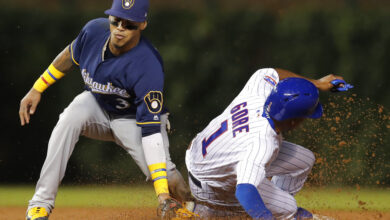
Theo Epstein May Also Be Haunted by Ghosts of Chicken and Beer
For Halloween, I wrote about how the Ghost of Carl Crawford could haunt Theo Epstein by inspiring greater caution when it comes to gargantuan free agent contracts this year. But this isn’t the only bad memory that may influence the exec’s thinking this offseason.
Epstein’s last season as Boston’s general manager ended with quite a media-circus mishegas. Howls of New England anger arose when that 2011 team missed the playoffs following a very disappointing September. Anonymous recriminations soon emerged about pitchers eating chicken and swilling beer in the clubhouse while a World Series-winning manager perhaps failed to maintain the right edge in the clubhouse.
I won’t detail all the incidents that contributed to Epstein and Boston parting ways (much to the Cubs’ benefit). You can read some of them here and here. But with recent reports claiming Epstein is “pissed off” about the way the season ended and how aspects of the Cubs’ clubhouse culture contributed to it, one can see how parallels to that 2011 Boston team could haunt him now.
Of course, Epstein’s relationship with his organizational superiors in Chicago is far better than back with Red Sox CEO Larry Lucchino. But from that experience Epstein knows how fast things can unravel on the field. From 2009-11, the Red Sox averaged the second-highest payroll in baseball. Even so, Epstein’s last playoff appearance in Boston came in 2009 – his seventh season leading the front office – when the Angels swept his team in the ALDS. His teams then fell short of the playoffs in each of the next two years.
As it happens, 2018 was Epstein’s seventh season in Chicago and this year’s squad also failed to win a playoff game. His team is also led by a player-friendly manager who takes pressure of his team and is loved by the media. Of course, no one accuses these Cubs of sitting around the clubhouse during games ordering out for fried chicken and guzzling beers. But perhaps similar over-confidence led to the erosion of an edge that just wasn’t there in September and October.
So what has Epstein done so far? He’s ratcheted up the pressure on his manager to maintain the right urgency in the clubhouse. He’s attempted to ignite an “or-else” fire under his players, many of whom have either never played for another organization or known success elsewhere. He has been vocal that he isn’t going to (or can’t) buy the most expensive free-agent placebo and that the current roster just needs to be more productive.
Will this be enough to silence memories of squawking Boston chickens in Epstein’s head? Can he effectively deliver his message without making significant lineup changes for a second consecutive offseason? Or should he just cross his fingers and hope for non-linear development from the likes of Carl Edwards Jr., Albert Almora Jr., Willson Contreras, Kyle Schwarber and maybe a contrite, rededicated Addison Russell?
Others advise – and I count myself among them – that a couple key pieces need changing. Not expensively, mind you. I think of Bryce Harper as a gold-plated piston replacement when the offense needs a different type of fuel injection. Likewise, what Manny Machado brings can be largely matched by cheaper, higher character leaders like Andrew McCutcheon and Adrian Beltre.
But to make no major changes wouldn’t befit Epstein’s history as the grand designer of Cubs success. He tore down and rebuilt the entire organization. He saw a tabula rasa for installing his ideal development processes. He codified it in the Cubs Way organizational book. He used advanced psychological evaluation to draft the right first-rounders. He added a mental skills program. He hired cooks and nutrition experts for each minor league team, as well as video coordinators for filming and logging as much footage on every player asset.
It almost feels like The Truman Show, that Jim Carey movie in which the god-like TV producer played by Ed Harris injects changes into the world he created to manipulate it toward his desired outcome. However, for fans of a different Ed Harris show, Westworld, danger lurks for those deluded enough to presume too much control over their creation.
In that HBO series, Anthony Hopkins plays the grand designer who ultimately learns his obsessive creation is destined to destroy him. Epstein shared this same fate in Boston, but are the memories of that strong enough to avert a repeat?
I like to imagine what a different Hopkins character – Hannibal Lecter – would think of all this. Perhaps no fictional character had a better insight into what obsessions drives a person to act as they do. So if Epstein can lead the Cubs to another championship, he may just be able to answer a paraphrasing of Lecter’s inevitable closing question in the affirmative
“Well, Theo – have the chickens stopped screaming?”

